-
 Bitcoin
Bitcoin $83,679.4949
-4.24% -
 Ethereum
Ethereum $1,879.8730
-6.62% -
 Tether USDt
Tether USDt $0.9993
-0.06% -
 XRP
XRP $2.1765
-7.55% -
 BNB
BNB $620.3856
-3.09% -
 Solana
Solana $129.2402
-7.23% -
 USDC
USDC $0.9999
0.00% -
 Dogecoin
Dogecoin $0.1798
-6.35% -
 Cardano
Cardano $0.6967
-5.51% -
 TRON
TRON $0.2334
-0.45% -
 Toncoin
Toncoin $3.8449
-1.85% -
 Chainlink
Chainlink $14.1201
-9.26% -
 UNUS SED LEO
UNUS SED LEO $9.7089
-0.56% -
 Stellar
Stellar $0.2716
-5.48% -
 Avalanche
Avalanche $19.8710
-10.02% -
 Sui
Sui $2.5111
-9.34% -
 Shiba Inu
Shiba Inu $0.0...01320
-6.67% -
 Hedera
Hedera $0.1807
-6.19% -
 Polkadot
Polkadot $4.2861
-6.86% -
 Litecoin
Litecoin $86.5710
-7.05% -
 MANTRA
MANTRA $6.2994
-3.30% -
 Bitcoin Cash
Bitcoin Cash $306.9623
-5.31% -
 Bitget Token
Bitget Token $4.7685
-4.35% -
 Pi
Pi $0.8251
0.13% -
 Dai
Dai $0.9998
-0.02% -
 Ethena USDe
Ethena USDe $0.9988
-0.03% -
 Hyperliquid
Hyperliquid $13.2221
-9.19% -
 Monero
Monero $216.2535
-3.28% -
 Uniswap
Uniswap $6.0959
-9.95% -
 Aptos
Aptos $5.5366
-6.67%
is metamask wallet a cold wallet
MetaMask, a convenient hot wallet, prioritizes accessibility over the offline security of cold wallets like Ledger and Trezor. While offering seamless dApp integration, its online nature increases vulnerability to hacking; thus, users should prioritize strong passphrases and 2FA.
Mar 24, 2025 at 11:00 pm
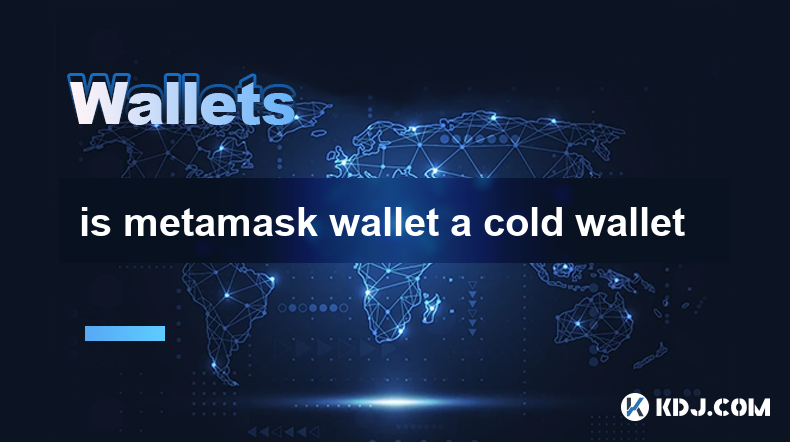
Key Points:
- MetaMask is not a cold wallet. It's a software wallet, specifically a hot wallet.
- Cold wallets prioritize security by storing private keys offline.
- Hot wallets, like MetaMask, are convenient but more vulnerable to hacking.
- Understanding the difference is crucial for securing your cryptocurrency.
- Alternatives to MetaMask for increased security exist, but involve trade-offs in convenience.
Is MetaMask Wallet a Cold Wallet?
No, MetaMask is emphatically not a cold wallet. MetaMask is a popular software wallet, and as such, it's categorized as a hot wallet. The crucial distinction lies in how private keys – the secret codes granting access to your cryptocurrency – are stored. Cold wallets keep these keys offline, making them significantly more secure against online threats like phishing attacks and malware. MetaMask, being a browser extension or mobile app, stores your keys on your connected device, making it inherently vulnerable to online risks.
Understanding Hot and Cold Wallets
Cold wallets are hardware devices designed specifically for cryptocurrency storage. They often resemble USB drives. Their offline nature makes them highly resistant to hacking attempts targeting online systems. Examples include Ledger and Trezor. Hot wallets, conversely, are software-based solutions. They offer ease of access and integration with decentralized applications (dApps), but their online nature makes them susceptible to various security breaches. MetaMask falls squarely into this category.
Security Implications of Using MetaMask
The convenience of MetaMask, its integration with various blockchain networks and its user-friendly interface are undeniable advantages. However, using MetaMask means accepting a higher level of risk compared to using a cold wallet. Your private keys are stored on your device, which could be compromised by malware, phishing scams, or even a compromised operating system. This vulnerability is the fundamental difference between a hot and cold wallet.
How to Increase Security with MetaMask
While MetaMask isn't a cold wallet, several steps can mitigate the risks:
- Strong Passphrase: Use a long, complex, and unique passphrase. Avoid easily guessable information.
- Two-Factor Authentication (2FA): Enable 2FA whenever possible to add an extra layer of security.
- Regular Software Updates: Keep your MetaMask extension and your device's operating system updated to patch security vulnerabilities.
- Beware of Phishing: Be extremely cautious of suspicious websites or emails requesting your seed phrase or passphrase. MetaMask will never ask for this information.
- Limit Funds: Only keep the cryptocurrency you need for immediate transactions in your MetaMask wallet. Store larger amounts in a cold wallet.
Alternatives to MetaMask for Enhanced Security
If security is your paramount concern, consider alternatives that offer cold storage solutions. Hardware wallets like Ledger and Trezor provide a much higher level of security. However, remember that these options require a steeper learning curve and may not offer the same seamless integration with dApps as MetaMask.
The Role of Seed Phrases in Wallet Security
Your seed phrase is a critical element in securing your cryptocurrency, regardless of the wallet type. It's a list of words that acts as the master key to your wallet. Losing or compromising your seed phrase means irreversible loss of access to your funds. Treat your seed phrase with the utmost secrecy. Never share it with anyone, and always store it securely offline.
Choosing the Right Wallet: Convenience vs. Security
The choice between a hot wallet like MetaMask and a cold wallet depends on your priorities. MetaMask provides ease of use and convenient access, making it ideal for frequent transactions. However, its security risks are higher. Cold wallets offer significantly improved security but are less convenient. Consider your individual needs and risk tolerance when making your decision.
Frequently Asked Questions
Q: Can I use MetaMask for large amounts of cryptocurrency?
A: While you can, it's generally not recommended to store large amounts of cryptocurrency in a hot wallet like MetaMask due to the increased security risk. Consider using a cold wallet for significant holdings.
Q: What happens if I lose my MetaMask seed phrase?
A: Losing your seed phrase means irreversible loss of access to your funds. There's no recovery mechanism. This applies to all wallets, not just MetaMask.
Q: Is it safe to use MetaMask on public Wi-Fi?
A: It's not recommended. Public Wi-Fi networks are less secure and increase your vulnerability to man-in-the-middle attacks.
Q: How can I tell if a website is trying to phish my MetaMask information?
A: Legitimate websites will never ask for your seed phrase or private keys. Be wary of suspicious websites, especially those requesting this information. Verify the website's legitimacy before interacting with it.
Q: What are the advantages of a cold wallet over a hot wallet?
A: Cold wallets offer significantly higher security due to their offline nature, making them less susceptible to hacking and malware. They are the preferred option for storing significant amounts of cryptocurrency.
Q: What are some examples of reputable cold wallets?
A: Ledger and Trezor are two of the most widely used and respected hardware wallets in the cryptocurrency space. They offer robust security features and are designed to protect your private keys.
Disclaimer:info@kdj.com
The information provided is not trading advice. kdj.com does not assume any responsibility for any investments made based on the information provided in this article. Cryptocurrencies are highly volatile and it is highly recommended that you invest with caution after thorough research!
If you believe that the content used on this website infringes your copyright, please contact us immediately (info@kdj.com) and we will delete it promptly.
- As Bitcoin sways like a ship in a macroeconomic storm, the threshold of $84,000 becomes a symbol of resistance.
- 2025-03-29 03:40:12
- GameStop plans to close more stores and turn its attention to cryptocurrency as the company begins investing in Bitcoin.
- 2025-03-29 03:40:12
- US President Donald Trump Plans to Meet with El Salvador President Nayib Bukele at the White House Next Month
- 2025-03-29 03:35:12
- Solana (SOL) Navigates a Pivotal Decision Point That Could Determine Its Next Major Move
- 2025-03-29 03:35:12
- The recent scrutiny of Cardano's native token, ADA, raises critical questions about its viability amidst escalating competition in the crypto space.
- 2025-03-29 03:30:12
- XploraDEX Is Witnessing a Breakout Moment as Investor Enthusiasm for the $XPL Token Soars
- 2025-03-29 03:30:12
Related knowledge
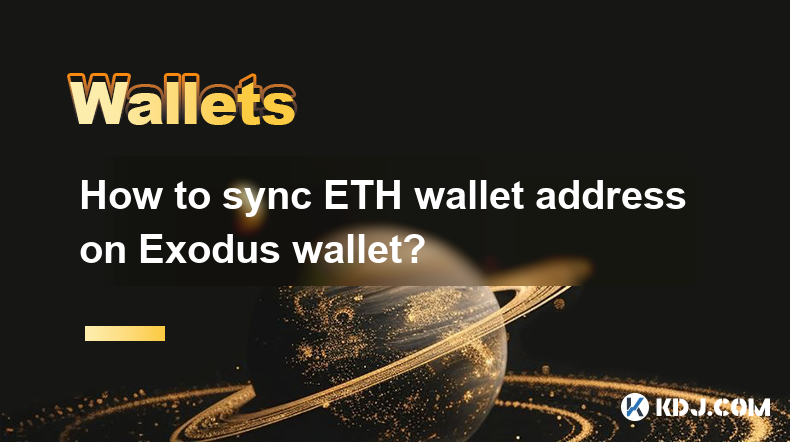
How to sync ETH wallet address on Exodus wallet?
Mar 29,2025 at 02:00am
Understanding Exodus Wallet and Ethereum IntegrationExodus is a popular multi-cryptocurrency wallet known for its user-friendly interface. It supports a wide range of cryptocurrencies, including Ethereum (ETH). Syncing your ETH wallet address within Exodus simply means ensuring your wallet is connected to the Ethereum blockchain and can display your ET...
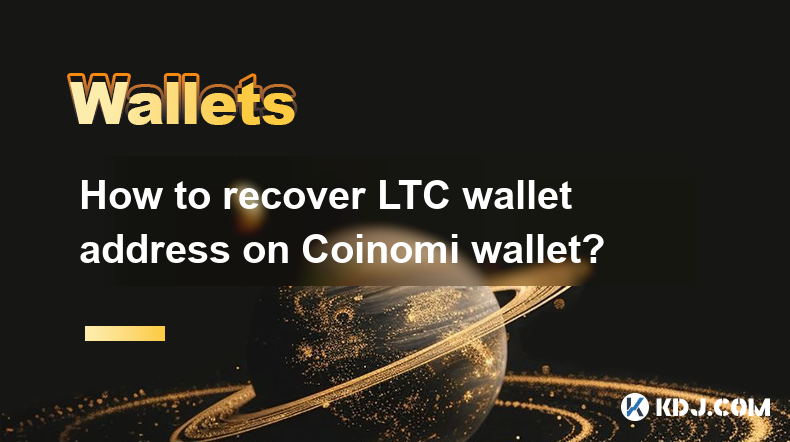
How to recover LTC wallet address on Coinomi wallet?
Mar 29,2025 at 01:35am
How to Recover Your Litecoin (LTC) Wallet Address on Coinomi Wallet Understanding Coinomi's Wallet Address SystemCoinomi is a multi-currency wallet, meaning it supports numerous cryptocurrencies, including Litecoin (LTC). Unlike some wallets that generate a new address for each transaction, Coinomi typically provides you with a single, primary LTC recei...
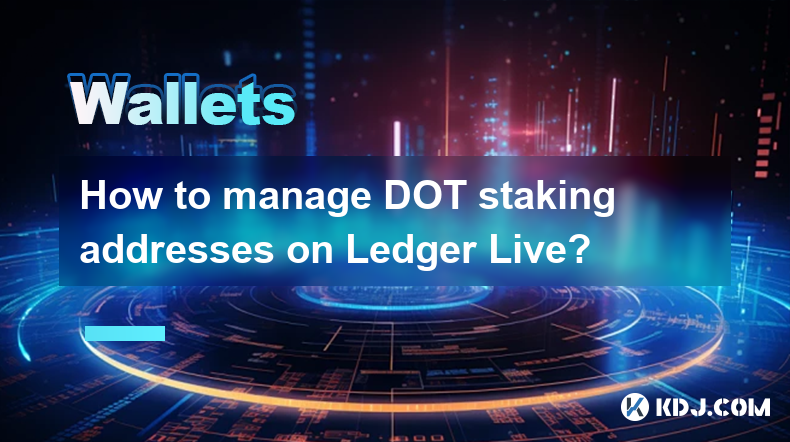
How to manage DOT staking addresses on Ledger Live?
Mar 29,2025 at 02:14am
Understanding DOT Staking and Ledger Live IntegrationPolkadot (DOT) staking allows users to lock up their DOT tokens to secure the network and earn rewards. Ledger Live, a user-friendly interface for managing Ledger hardware wallets, offers a convenient way to interact with your DOT holdings, including staking. However, it's crucial to understand that ...
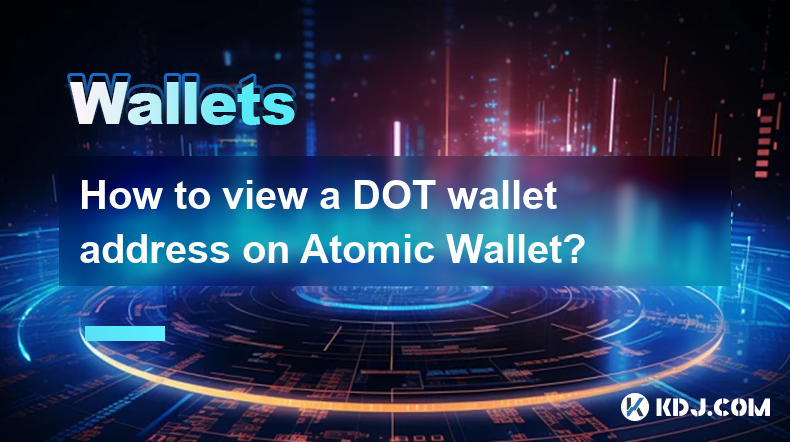
How to view a DOT wallet address on Atomic Wallet?
Mar 29,2025 at 01:50am
Locating Your Polkadot (DOT) Wallet Address in Atomic WalletAtomic Wallet is a popular multi-currency wallet that supports Polkadot (DOT). Finding your DOT address within the wallet is straightforward, but requires understanding the wallet's interface. This guide will walk you through the process step-by-step. Remember, your DOT address is crucial for ...
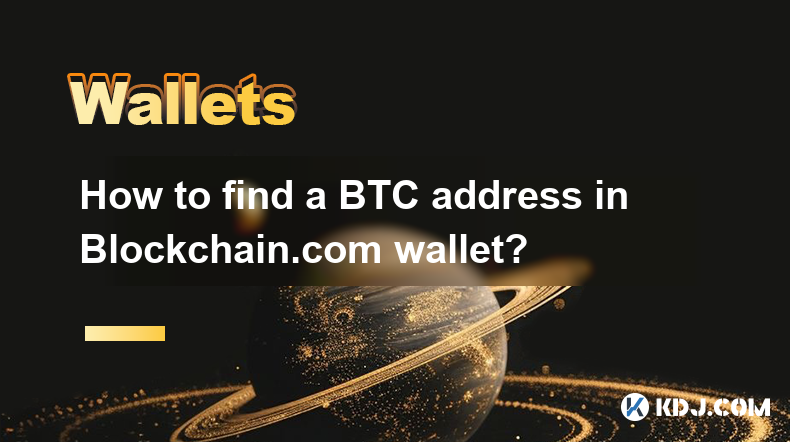
How to find a BTC address in Blockchain.com wallet?
Mar 29,2025 at 03:42am
Locating Your Bitcoin Address on Blockchain.comBlockchain.com is a popular cryptocurrency wallet and exchange. Finding your Bitcoin (BTC) address within the platform is straightforward, but understanding where to look depends on whether you're receiving or sending BTC. The process differs slightly depending on your specific needs. First, ensure you're ...
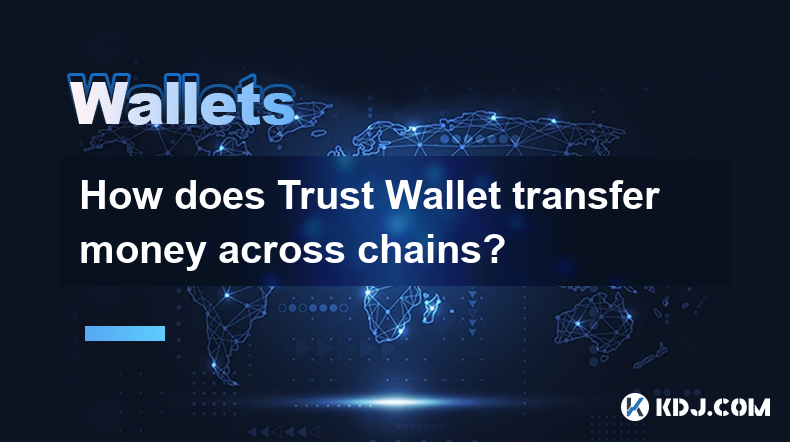
How does Trust Wallet transfer money across chains?
Mar 28,2025 at 10:49pm
Understanding Cross-Chain Transfers with Trust WalletTrust Wallet doesn't directly 'transfer money' in the traditional sense. Instead, it facilitates the movement of cryptocurrency assets between different blockchains. This process, known as a cross-chain transfer, involves several steps and often utilizes intermediary protocols or bridges. Understandi...

How to sync ETH wallet address on Exodus wallet?
Mar 29,2025 at 02:00am
Understanding Exodus Wallet and Ethereum IntegrationExodus is a popular multi-cryptocurrency wallet known for its user-friendly interface. It supports a wide range of cryptocurrencies, including Ethereum (ETH). Syncing your ETH wallet address within Exodus simply means ensuring your wallet is connected to the Ethereum blockchain and can display your ET...

How to recover LTC wallet address on Coinomi wallet?
Mar 29,2025 at 01:35am
How to Recover Your Litecoin (LTC) Wallet Address on Coinomi Wallet Understanding Coinomi's Wallet Address SystemCoinomi is a multi-currency wallet, meaning it supports numerous cryptocurrencies, including Litecoin (LTC). Unlike some wallets that generate a new address for each transaction, Coinomi typically provides you with a single, primary LTC recei...

How to manage DOT staking addresses on Ledger Live?
Mar 29,2025 at 02:14am
Understanding DOT Staking and Ledger Live IntegrationPolkadot (DOT) staking allows users to lock up their DOT tokens to secure the network and earn rewards. Ledger Live, a user-friendly interface for managing Ledger hardware wallets, offers a convenient way to interact with your DOT holdings, including staking. However, it's crucial to understand that ...

How to view a DOT wallet address on Atomic Wallet?
Mar 29,2025 at 01:50am
Locating Your Polkadot (DOT) Wallet Address in Atomic WalletAtomic Wallet is a popular multi-currency wallet that supports Polkadot (DOT). Finding your DOT address within the wallet is straightforward, but requires understanding the wallet's interface. This guide will walk you through the process step-by-step. Remember, your DOT address is crucial for ...

How to find a BTC address in Blockchain.com wallet?
Mar 29,2025 at 03:42am
Locating Your Bitcoin Address on Blockchain.comBlockchain.com is a popular cryptocurrency wallet and exchange. Finding your Bitcoin (BTC) address within the platform is straightforward, but understanding where to look depends on whether you're receiving or sending BTC. The process differs slightly depending on your specific needs. First, ensure you're ...

How does Trust Wallet transfer money across chains?
Mar 28,2025 at 10:49pm
Understanding Cross-Chain Transfers with Trust WalletTrust Wallet doesn't directly 'transfer money' in the traditional sense. Instead, it facilitates the movement of cryptocurrency assets between different blockchains. This process, known as a cross-chain transfer, involves several steps and often utilizes intermediary protocols or bridges. Understandi...
See all articles






















































































